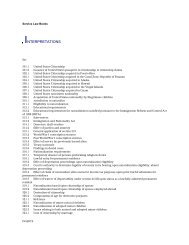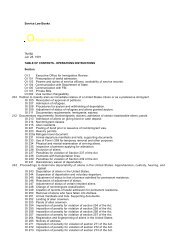Create successful ePaper yourself
Turn your PDF publications into a flip-book with our unique Google optimized e-Paper software.
<strong>Inspector's</strong> <strong>Field</strong> <strong>Manual</strong><br />
Terms of admission: Admit NATO-6 for duration of status.<br />
Notations on I-94: NATO-6, D/S<br />
Special notes:<br />
(A) Distinction between NATO officials and NATO members of Armed Forces. Nonmilitary NATO<br />
nonimmigrants should not be confused with members of NATO Forces entering under official orders with<br />
proper identification who are exempt inspection and therefore, exempt normal passport and nonimmigrant visa<br />
requirements.<br />
(B) NATO countries. See list in Chapter 11.2.<br />
(C) Dependents: Admit dependents in same category as principal. Dependents may attend school<br />
without changing status and may be granted employment authorization under 8 CFR 274a.12(c).<br />
(7) Classification: NATO-7 Includes attendants, servants, or personal employees of NATO-1 through<br />
NATO-6, and members of their immediate family.<br />
Documents required: Passport must be valid for 6 months beyond the date to which the alien desires to be<br />
admitted. Nonimmigrant visa (NATO-7).<br />
Qualifications: Must be alien described above. All nonimmigrant grounds of inadmissibility apply.<br />
Terms of admission: Admit (NATO-7) for Duration of Status if employed by NATO-1 through NATO-4. Admit<br />
(NATO-7) for 2 years if employed by NATO-5 or NATO-6.<br />
Notations on I-94: NATO-7, D/S or 2 years from date of admission. Enter name of employer in block 26, on<br />
reverse of I-94.<br />
Special notes:<br />
(A) NATO countries. See list in Chapter 11.2<br />
(B) Dependents: Admit dependents in same category as principal. Dependents may attend school<br />
without changing status and may be granted employment authorization under 8 CFR 274a.12(c).<br />
15.5 NAFTA Admissions.<br />
(a) General. The North American Free Trade Agreement (NAFTA) between the United States, Canada, and<br />
Mexico entered into force on January 1, 1994. Chapter 16 of NAFTA pertains to Canadian and Mexican citizens<br />
seeking classification as one of four types of business persons:<br />
- B-1 temporary visitors for business under section 101(a)(15)(B) of the Act;<br />
- E-1 or E-2 treaty traders and treaty investors under section 101(a)(15)(E) of the Act;<br />
- L-1 intracompany transferees under section 101(a)(15)(L) of the Act; and<br />
- TN professional level employees under section 214(e) of the Act.<br />
The NAFTA is an historic accord governing the largest trilateral trade relationship in the world and covers<br />
trade in goods, services, and investments. In order to take advantage of the benefits of freer trade, NAFTA<br />
facilitates the movement of U.S., Canadian, and Mexican business persons across each country's border through<br />
streamlined procedures. The NAFTA maintains the provisions of existing laws that ensure border security and<br />
protect indigenous labor and permanent employment. Further, NAFTA fully protects the ability of state<br />
governments to require that Canadians and Mexicans practicing a profession in the United States are fully<br />
licensed under state law to do so. Current U.S. law and practice relating to exclusion and deportation of aliens<br />
applies unchanged to all business persons seeking temporary entry under the provisions of Chapter 16 of the




